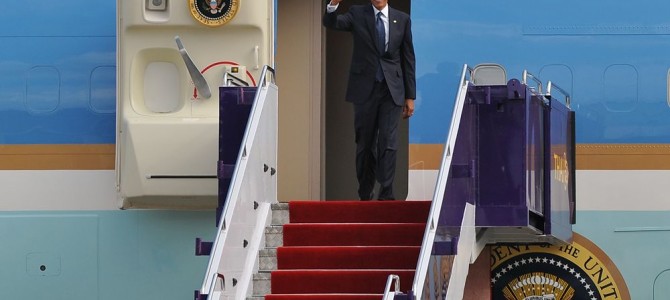
President Obama is going to Hiroshima—but not, as critics had feared, to say sorry. The Guardian reports the president told Japan’s NHK that “no apologies would be included in brief remarks he is expected to make in the western Japanese city.”
“It’s important to recognize that in the midst of war, leaders make all kinds of decisions, it’s a job of historians to ask questions and examine them,” he said. “But I know, as somebody who’s now sat in this position for the last seven and half years, that every leader makes very difficult decisions, particularly during wartime.”
Unfortunately for this president, his difficult decisions have left the United States and its allies in a historically uncertain position. Although raw American power remains disproportionate to that of its enemies, sometimes staggeringly so, the thing about a gun is one must know where to point it. At a geopolitical moment as unstable as today’s, flexing great force becomes a difficulty all its own.
Therefore the timing of Obama’s Hiroshima visit is particularly, awkwardly fitting. In Japan, the United States has an ally where once it faced an implacable foe—all to the good with China now our main Pacific adversary, although, true to global form, it presents yet another case where naked might is inadequate to safeguard American interests. Of all the harsh truths surrounding Hiroshima, the fact that the atom bomb changed Japan from an enemy to a friend is perhaps the harshest—and perhaps the most humbling—of all.
We Want to Nuke Our Enemies
By a strange serendipity, many Americans—primed to internalize the full measure of soul-searching and self-loathing aroused by our use of the Bomb—are actually poised to recognize what dark and powerful wisdom Hiroshima has to share.
On the surface, following an extended cultural trend, respectable people refuse to imagine that terrible, violent means can accomplish good and peaceful results. But a growing number of respectable people actually do believe that the only way America can progress toward justice is by simply crushing and defeating those who stand in the way. Consider the culture-war controversies playing out in the wake of the sesquicentennial of the Civil War, ranging from the removal of Confederate flags and monuments to the call for the day of the South’s defeat to become a national holiday.
“There was a real but inadequate constituency for crushing the Southern establishment after the Civil War, and reintegrating the country under an entirely different paradigm,” wrote The New Republic’s Brian Beutler, making the case. “Instead, the North enabled the South by giving it unusual influence over shaping the official mythology of the war.” As a result, its culture of systemic bigotry and racism persisted, infecting politics, policy, and the law. If only the bad guys had been obliterated instead! It’s increasingly on trend to morally validate the sheer scourging of those in the wrong.
Even a Giant Display of Power Has Complex Results
Remarkably, then, the atomic bombing of Japan takes on an uncannily liberal sheen. There’s just no question that the Imperial Japanese had become very bad, very wrong people indeed. To be sure, there’s something deeply bad, too, about annihilating cities full of civilians with weapons whose creators had feared could ignite the atmosphere and incinerate the world. That sort of destructive power does not do the human race a favor.
On the other hand, the Bomb allowed the United States to simply wipe out the possibility of Japanese imperialism. There may be something so primal and wicked about illiberal militants that our way of life can only prevail if theirs is stamped out at every opportunity.
But Hiroshima also reminds us that sometimes illiberalism is such a problem that not even nukes will do. Dropping the Bomb did not relieve the United States of the costs and burdens of sustaining the military occupation that followed, or the security umbrella Japan required. It was a strategically “clean” solution only in a very narrow sense.
Indeed, using atomic weapons against Japan did not prove that illiberalism could be crushed in a brand new way. Rather than blasting clear the path toward global freedom, the realities of the Bomb led civilian U.S. policymakers to opt against nuking the Russians or the Chinese—ushering in generations of protracted and uncertain conflict. As well as the apocalyptic end of World War II worked out for future Americans and Japanese, our values helped ensure that, when we gained the power of absolute destruction, we became wise and humble enough not to unleash it time and again.
That makes for difficult, enduring struggles. It also makes for the confidence that difficult, enduring struggles can ultimately be won. Unfortunately for America and its allies, president Obama seems largely content to leave the task of sustaining that confidence to the next occupant of the White House. In observing the anniversary of Hiroshima’s destruction, he is right to leave out the atomic apologies. But in allowing illiberalism to run rampant around the world under his watch, he has worsened the kind of challenges not even the most powerful bombs can well resolve. For that—though, to be sure, sorry isn’t good enough—the president could surely apologize.









